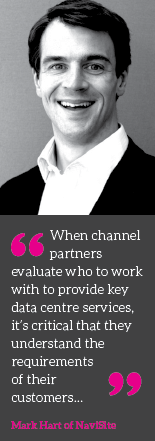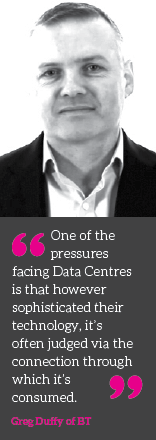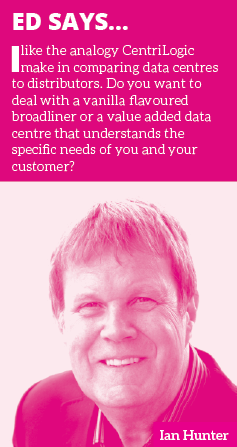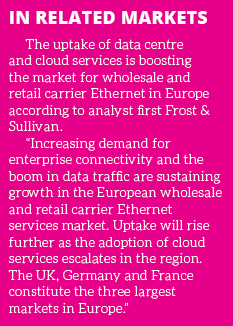
Data Centres face many challenges – not least of which is how to differentiate themselves in the market and appear as being user friendly to the channel. Or is that how they should differentiate themselves?
If hosted and cloud based applications are to thrive then they need a secure platform and location from which to operate and with such a diverse range of applications being developed by service providers and resellers seeking to differentiate their offerings, the Data Centre is emerging as the key and core component in the mix.
 The market is getting ever more competitive and for table stakes ‘state of the art everything’ – power, security and redundancy etc., is now required as standard.
The market is getting ever more competitive and for table stakes ‘state of the art everything’ – power, security and redundancy etc., is now required as standard.
Ian Millward, Head of Channel Sales North at Node4, says his company believes that Data Centres are at the heart of the increasingly cloud-based and hosted world of business IT infrastructure.
“The benefits to end-users include ease of deployment, increased resiliency and reduced cost. But there are also significant benefits for resellers in partnering with a Data Centre.
For example, Node4 provides services in areas such as: cloud, colocation, managed hosting through cloud and virtualised environments, connectivity, SIP trunking and hosted telephony. This means that if a partner wants to use the same team and same sites to deliver multiple services at once or a complete end-to-end solution, we can support a whole range of integrated solutions as well as any one in isolation.
Buying IT is changing rapidly. Businesses are within their rights to expect more flexibility from IT providers. They don’t want to pay for services they are unlikely to use or gain value from. Tailoring a solution to the specific needs of a customer is a growing trend in the technology industry now and with the growth of hybrid cloud and managed services, enterprises can expect customised solutions and varying levels of support. Furthermore, outsourcing IT is a big leap for an organisation to take. They not only want to know that their infrastructure is high quality, but also that their data and equipment is secure, supported and in expert hands.
There’s a huge opportunity for vendors and partners that take customer service seriously. It’s not enough to just be on hand to fix problems. Data Centres must go above and beyond for their customers by getting the solution just right. Of course, vendors and partners need to see a return on investment. However, getting customer service right and empowering the customer to make better decisions makes good business sense.
Being ‘channel friendly’ shouldn’t be an alien concept to vendors - we think it’s quite simple. We want to be exactly what our partners want us to be. That’s to be the easiest company to do business with and show a guaranteed return on investment. While the ability to offer a comprehensive service can be valuable, at Node4 we don’t believe in an ‘all or nothing’ mindset. We’re happy to let partners use as many of our services as they like. That way we can deliver true value to their businesses.”
Magic Triangle
Gary Barter Marketing Manager at C4L, says that whilst it is true that ‘state of the art everything’ will always grab headlines and gain customer interest and column inches, in fact, as with many aspects of the industry and the channel, there is no substitute for understanding the customer requirement and doing it really well.

“You do not need a hybrid BMW i8 car, where Land Rover technology and reliability is far better suited.
Differentiation through excellent service, reliability, security and trust are probably more important in the Data Centre market than having blue LED floor lights and biometric loading bay doors. Of course that is not to say that we should ignore the benefits of new innovation, but the point here is to properly weight the cost and benefit, the same way you would if you were doing it in your office.
In our experience colocation differentiation is driven by a magic triangle of Geographic Location, Technical Specification and Price. These three items tend to lead to a natural selection of colo facility, based on the need for best price, best performance or specific location, it would be rare that a customer or channel partner were to demand a location with a particular ‘state of the art’ feature or facility. There is what one would term a minimum viable specification necessary, but the DC tier system typically means that tier 2 or 3 locations meet nearly all business needs in most cases.
One area where this is not so much the case is in ‘state of the art’ connectivity, this is in our opinion increasingly becoming a key differentiator. With a large number of DC sites offering broadly similar technical specifications at increasingly commodity prices, then more often than not the availability, performance and scalability of connectivity between Data Centre sites and to other service providers is now the differentiator. In the past the limiting factor preventing businesses from opting for co-location or even the cloud, has been connectivity, with this barrier now starting to be removed then the actual colo facility becomes less relevant, since connectivity levels the playing field.”
Selection Process
Venus Business Communications operates a comprehensive fibre optic network across London that continues to expand. Originally the network grew from around Covent Garden and included Telehouse North as one of its first data centres.
“Choosing this data centre was easy as the data centre stood out as a major provider close to the point at which our network originated from. In addition to location it is used by a high density of higher tier carriers facilitating easy connection to other networks for our customers,” recalls Brian Iddon, Director. Today the Venus Dark Fibre network spans London and has 10 datacentres with Volta being the newest and most recent to be on the Venus network. There are over 60 datacentres across London that Venus could connect to and it is not economically viable to be in every one of them, so Venus carefully selects the datacentres it has on its network to ensure that customers experience state of the art service and resellers benefit from a top quality product.
“In selecting a data centre there are a number of important criteria that a data centre has to meet. The first is location. City Lifeline is a classic example as the Venus network expanded into the docklands. A great demand from clients looking for a responsive high connectivity network made City Lifeline an obvious choice. Its location was supported by a competitive pricing structure and a solid reputation with the ability for customers to access other networks. However location continued to be key requiring only short runs of cable to connect fibre,” says Iddon.
More Differentiation…
Data Centres face a number of challenges to differentiate but according to Greg Duffy, Head of Commercial, Product and Marketing for Networked IT Services at BT Business, there is an opportunity for Data Centres and application service providers to create a really attractive offer that differentiates over traditional hosting services.
“One of the pressures facing Data Centres is that however sophisticated their technology, it’s often judged via the connection through which it’s consumed. It doesn’t matter how strong a Data Centre offering is, if customers can’t connect quickly and reliably then they’ll never realise the benefits of their application”.
So how do resellers choose a Data Centre that can get round this? By selecting one that’s services embed high performance network into their core proposition, which can be done in three steps:
Step one is to connect the data centre into a reliable, high performance network. BT has two networks that both use the scale and resilience built to support the UK’s critical national infrastructure. Traditionally connection is by purchasing a fibre Ethernet connection from the data centre to a point of presence, or PoP, in BT’s network.
BT is now putting PoPs directly into key data centres such as Telehouse and Global Switch (London), Telecity (Manchester), NGD (Newport), Equinix (Slough) and Sungard (Elland). By running applications from these data centres, service providers enjoy a significant advantage; no need to buy a fibre connection, critically no need to buy twin fibres as the PoP is fully resilient.
Step two is to connect end-customer sites. As each new customer is taken on, simply purchase a new circuit to connect their site to the network, and then a private virtual circuit to connect across the network, right into the data centre – don’t forget to offer a choice of access from EFM to fibre Ethernet.
Also, look out for customers who already have a connection into the private network. For these customers BT has a facility called Shared Access that lets them share their access with yours – saving the purchase of an extra circuit.
Step three is to get support. A good network partner will offer valuable technical and commercial support.”
The Value Add
Nigel Offley, VP for EMEA at CentriLogic, a global provider of managed hosting, cloud computing, and advanced IT outsourcing solutions, makes an interesting analogy.

“The rise of cloud and SaaS based technologies is prompting the channel to engage more closely with data centre service providers. However, there is a huge variance in the offerings available to the channel and in many ways they mirror the relationship with distributors. The likes of Amazon Web Services and Azure are akin to broadliners. They tend to have volume but these are vanilla offerings where the channel partners are expected to do all the value add and get very little help from the service provider. This is not necessarily a bad thing in certain use cases but complex solutions that require local data centre integration and additional customisation are not a good fit. In essence, these are volume operations that benefit from economies of scale but are notsetup to offer much support.
The mid-sized data centre and co-location providers could be considered as akin to value added distributors, but just like VADs, there is a lot of variance. In many cases within this tier there is a desire to form partnerships that offer longer term profitability. These are data centre service providers that just like the channel are trying to differentiate through technical and support services that allow partners to sustain and grow the customer relationship. This is the area that CentriLogic serves.”

